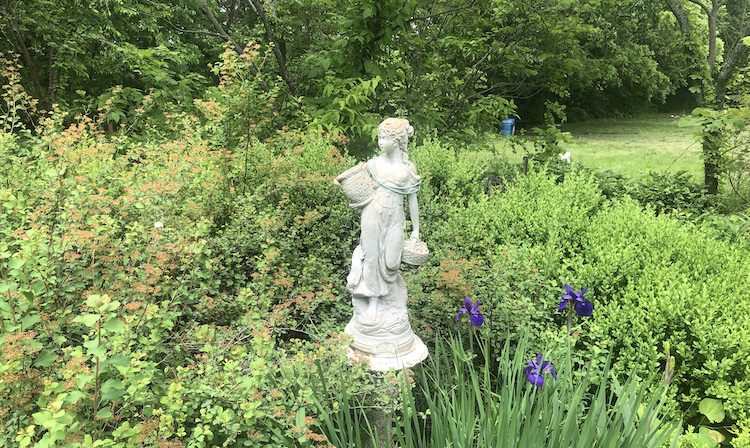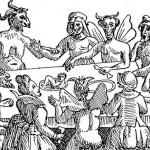I have a deep seated skepticism of people who advocate for “full time Pagan clergy.” Certainly Pagans with a good grasp on clergy practices are needed, but “full time clergy” ends up too close to Christian models of religious institutions. I’ll also admit that it feels like many of the people who are loudest about 24-hour clergy feel like they are campaigning to be given the job.

That doesn’t mean I look askance at everyone who claims to be clergy, or all of the institutions that train people for such endeavours. I have deep respect for groups like Circle Sanctuary (Selena Fox can speak for me anytime, and the people I’ve met at Circle over the last few years are great people) and ADF, but I’m still generally wary of random person I’ve never heard of asking me to subsidize whatever their work is. (Many national groups also expect public service out of their leaders, and many go about such work quietly and effectively.)
I often feel like I”m in the middle of two worlds, for while I’m cautious when it comes to clergy, there is a deep need in the Pagan Community for more people with the knowledge to handle the specialized circumstances we associate with leadership or ministerial roles. This perspective comes from personal experience too. A little over eight years ago a friend of mine’s husband committed suicide leaving not only his wife, but two young children, and she asked me to lead his memorial service. This was a tragic development in any case, but made even more difficult by the fact that we Pagans don’t really have the training for such experiences.

By the time I lead that memorial service I had officiated dozens of weddings, and led several large group rituals at festivals around the country. (I think those rituals were generally successful, but one never knows for sure!) I had some time to prepare for the service before leading it, and read as much material as I could on how to facilitate such a rite. But even if my words were all OK, there was still an emotional component that can’t be overcome simply by reading books. Watching a father say goodbye to his son, along with two sons saying goodbye to their father, was heavy.
That particular set of circumstances were a bit of extraordinary, and it’s likely that most people in my (or your) position will never have to lead such a ritual. But many in the Pagan Community face challenges I’d argue that they are ill prepared for, and that doesn’t seem likely to change. We take ritual facilitation for granted most of the time, anyone can do a ritual, right? Yes, anyone can probably lead a ritual, but doing it well requires more than a solid grounding in Cunningham’s Wicca For the Solitary Practitioner.
Large, public, group ritual is one of the trickiest things to pull off in the Pagan Community. The earliest Witchcraft rituals were written for groups with a maximum of maybe 15 people, and it’s doubtful that anyone could have imagined rituals with hundreds of people back in the 1950’s. It’s true that there were big public Witch rituals in the 60’s, but those were generally full of non-Witches and were not all that interactive. Today are expectations are higher.
I would argue that most people are trained to lead large group ritual with the words “good luck!” For most of us in the Pagan Community, we’ve learned through experience in such situations. I’m a part of an initiate only tradition, but the rituals for that tradition are small-scale, for covens, not 400 people at Pagan Spirit Gathering. I’ve learned to lead large rituals over the years by doing them mostly, along with the occasional advice of friends, peers, and acquaintances.
Vexing questions like the ones posed here have been running through my brain for years, but were recently reawoken by a survey sent out by Cherry Hill Seminary (and this post has been slow to go live, it’s since been informed by conversations with Phoenix Silverstar at Woolston-Steen and John Beckett’s recent post on similar ideas). When Cherry Hill first began in the 1990’s the idea of a “pan-Pagan seminary” most likely made sense to many. (Full disclosure I’m a Gen X’er and discovered the Craft in the early 1990’s.) We really did believe that there was more to unite us than divide us spiritually, I’m not sure that’s the case anymore.
The Pagan Umbrella has grown more and more fractious over the last 25 years. When a Devotional Polytheist loudly advocates that “duotheistic Wiccans” not be allowed to speak at a polytheist gathering you know you’ve reached a point when the roads are doing more than just diverging. It sometimes feel like we are practically on different freeways. (I still think there’s more that unites us than divides us, but many don’t share my optimism. And when it comes to polytheism and devotion, I leave my offerings and see deities as distinct beings, but that’s for another day.)

I’m also not sure that there’s enough “work” to do in Pagandom that necessitates the need for paid Pagan clergy outside of specific groups and certain rites of passage. (When hiring a professional to officiate your handfasting, you should probably pay them.) If your group has several hundred members, yeah, certainly you need someone to run things, and generally those positions are voted upon or held by whoever founded the group. My most dire skepticism tends to be reserved for person I’ve never heard of advocating for paid clergy because it’s something they want to do.
I often think Pagan clergy as an idea is something that we’ve inherited from Christianity. Our local groups are generally small; a strong coven or grove might have 15 regular members (and I’m sure many have more, while many also have quite less). That’s not the same as a church with 100 or 500 people and weekly services. There’s also nothing separating any of us from the divine (assuming one believes in such things-yet another challenge!). We have no need for anyone to explain “sacred scripture” to us pray on our behalf. In the Craft at least, all are Priestesses or Priests (or whatever other synonym you’d like to add here).
When I think of groups like Cherry Hill what I really wish they’d do, and they already have to some degree, is develop classes and programs designed to help Pagans with the day to day and year to year challenges of being in a spiritual community. Instead of worrying about history and theology, let’s get down to the nuts and bolts of developing strong programs help people facilitate rituals of transition, along with the skills necessary to lead large group ritual. Those kinds of classes don’t have to be taught by a PhD either, they can be facilitated by individuals who are simply good at doing such things.
The price point here is important too. Such classes need to be affordable and not overly long. An eight hour class on leading large group ritual that’s financially accessible to thousands of people is far more beneficial than a college level course with a prohibitive price tag. I certainly want to see teachers of such things get paid, and infrastructure costs recouped, but the price of such things should drop if they are independent of degree programs.
Due to the skepticism held by many in the community, credentials are generally meaningless outside of a specific group or tradition, instead, people respect those who are good at the doing. Let’s focus on providing those skills, along with making all of it affordable so we can grow our communities. I remain unconvinced that degrees in Pagan Spirituality or Theology have much meaning due to the varied nature of Modern Pagandom. (Hell, I don’t even agree with a lot of Wiccans on what we do! And you want to add more groups to that mix?)
Maybe in 50 or 100 years there will be a true need for paid Pagan clergy in circumstances removed from individual groups. The Modern Pagan experiment has really only been going on for about 70 years. I think sometimes we try and move too fast, and I’d rather make incremental progress than watch us trip over our own feet.
Update: I have no idea if this article is going to resonate with lots of people, but since its posting there has been a lively discussion on my Facebook page on the issues raised within it. I realize this is a rather ramble-like piece, and contains a lot of very different thoughts, but to summarize:
1. Pagans have a desperate need for experienced and trained clergy. However, the Pagan world is far too diverse for any one person to represent a community full of Witches, Druids, Devotional Polytheists, Atheo-Pagans, and Heathens.
2. Because of that diversity, a “temple” home to various faiths led by a 24-7 caretaker doesn’t feel viable to me. (Not surprisingly, the people who want to be that caretaker are those most likely to disagree with me.)
3. Institutions are changing to meet the needs of our community, but I’m not sure we’ve developed a model yet that both meets our needs and comes at a price-point people are willing to pay.
4. There are several Pagans who work as chaplains and such, but for the most part, they don’t minister strictly to Pagans. I think it’s great that we are a becoming a part of a larger conversation, but I’m not addressing that here.
5. While I play up ritual in this article, there are other services often offered by mainstream clergy that we as a community are mostly not in a position to handle. Who is going to talk to the Witch or Druid in hospice, especially if those individuals have largely operated as solitaries? I’m not sure I have an answer.
6. The Pagan community is structured very differently than most other religious and spiritual movements in the Western World today. We are small independent groups mostly, and that represents significant challenges. We also have very different ideas on deity and belief, and those beliefs vary inside specific traditions too. There are things that unite most Christian groups, I’d argue that we lack many of those unifying traits.
You are also free to disagree with me on all of this, I love you anyways.













